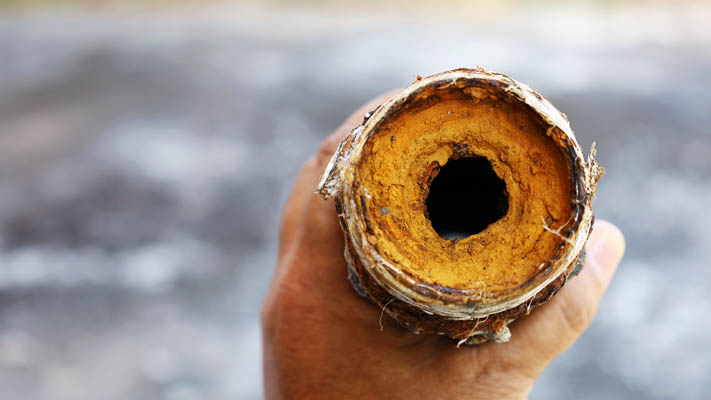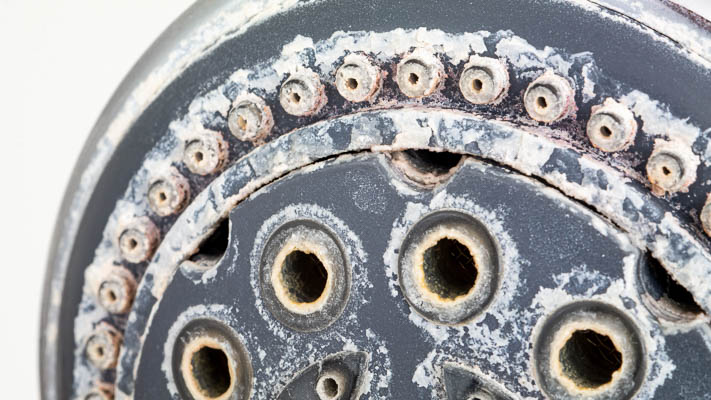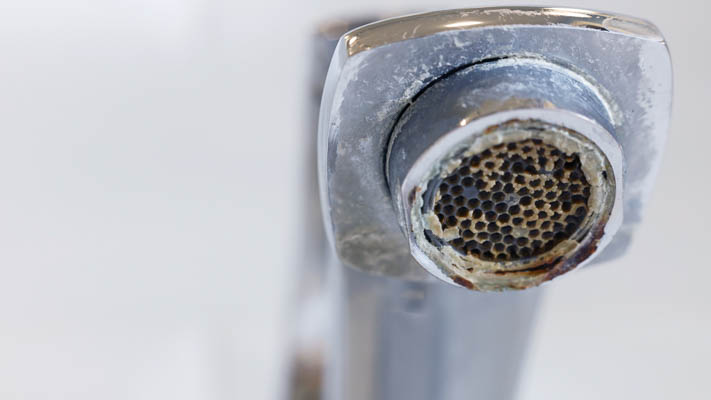How Does Mineral Buildup Restrict Water Pressure?
Mineral build-up within a home's freshwater plumbing system can significantly restrict water pressure, leading to a range of plumbing issues.
Over time, minerals such as calcium, magnesium, and iron can gather on the inner walls of pipes and fixtures, forming deposits that narrow the pathway for water flow.
As these deposits thicken, the diameter of the pipe shrinks, causing increased resistance for water as it traverses the plumbing network. This buildup can also cause clogs by entrapping debris on the roughened surface.
Mineral build-up is especially noticeable on showerheads and faucets, which can experience diminished water pressure due to their small openings getting obstructed by mineral deposits. Household appliances such as dishwashers, washing machines, and water heaters are also susceptible to mineral accumulation.
For more information on low water pressure, we have an ultimate guide that details the many systemic causes of low water pressure and how to tackle them.
Get your free estimate today
With over 75,000 repipes completed, we've perfected our One-Stop Repipe™ for your home.
What Causes Mineral Buildup in Home Plumbing?
Mineral buildup in your home's plumbing can stem from various causes, including:
- Hard Water: Water hardness refers to the amount mineral concentration in the water. Hard water has a higher concentration of minerals like calcium and magnesium. As hard water flows through pipes over time, these minerals can build up on the inner surfaces, leading to reduced water pressure and clogs. For more information, check out our detailed article on how hard water affects home plumbing systems.
- Old Galvanized Pipes: As the zinc coating inside galvanized pipes wears away over time, the exposed steel or iron reacts with oxygen and chemicals in the water, causing rust and corrosion. This leads to a buildup of rust and scale inside the pipes, which can greatly reduce water flow. The reduced flow is most noticeable at hot water outlets and those farthest from the water source.
- Copper Pipes: Copper pipes can react with certain minerals in the water supply, especially when the water's pH is too high. This reaction can cause mineral particles to accumulate, reducing water pressure over time. Due to the many connections and bends in copper piping, mineral buildup is more common than in materials like PEX. Additionally, this buildup can lead to pinhole leaks, a frequent issue in copper pipes.

How Can I Fix Mineral Buildup?
If you are worried about mineral build-up in your home's plumbing, you can help minimize it by installing a water softening system or a whole home filtration system. These systems can reduce the hardness of the water using different methods.

Once mineral buildup has formed inside the pipes, there is no effective way to clean them, and replacement becomes necessary. A whole-home repipe is a more cost-effective solution than multiple partial replacements of pipes affected by mineral buildup.
To extend the life of your pipes, consider using PEX (cross-linked polyethylene) tubing, which is generally more resistant to mineral buildup than materials like copper. PEX tubing offers several benefits, particularly when it comes to preventing mineral buildup and maintaining water pressure. One key advantage is that it can be installed in continuous lengths from a central manifold directly to the outlets, reducing the number of connections and tight bends. This leads to better water flow and less mineral accumulation.
The smooth interior surface of PEX tubing discourages minerals from adhering to the pipe walls, reducing the formation of scale. (Note: All pipe materials are affected by hard water, including PEX. However, PEX generally demonstrates greater effectiveness against scale buildup.)
Replacing your damaged pipes with PEX tubing improves their resistance to mineral buildup and ensures a reliable plumbing system that will last for years to come.
Get a Quote to Repipe Your Home
Here at Repipe Specialists, we've fully replaced plumbing in thousands of homes across the USA with modern Uponor PEX tubing. We continually get positive customer feedback from customers at how pleased they are with their fast flowing, high pressure water post-repipe. We often exceed their expectations on:
- Speed: Our repipe crews typically complete a repipe in a day, returning on another day for wall patching.
- Convenience: Through our One-Stop Repipe™ process, we handle everything from permits, to wall patching, to inspections.
- Cleanliness: Our crews are trained to protect your home while working (we cover all surfaces with protective sheeting), and to clean up fully at the end of each day.
- Peace of Mind: Repipe Specialists is a fully licensed plumber in every state we operate in, and we back all of our repipes with a lifetime warranty.
- Financing programs: To help take the sting out of unplanned repipe expenses, we offer several financing programs.
- Price: As a specialist that performs hundreds of repipes a week, we can deliver high-quality repipes at a lower cost vs generalist plumbers. We have another article that covers whole house repipe cost factors in detail. Our quotes typically range from $4,500 to $15,000 depending on the size and complexity of your project.
Schedule a free in-home consult, and a local repipe consultant will explain all your repiping options and provide you with a written, fixed price quote. Replace your damaged pipes to enjoy reduced mineral buildup and better water pressure.

